- Home
- Anne Lamott
Crooked Little Heart
Crooked Little Heart Read online
Praise for Anne Lamott and Crooked Little Heart
“Humbert Humbert rhapsodized memorably about Lolita’s elegant, if ineffectual, tennis game; something about this beautiful, warbling novel feels like that unfortunate kid’s revenge … No nymphets here—just as much poetry as could possibly be extracted from a difficult adolescence. A.”
—Entertainment Weekly
“Armed with self-effacing humor and ruthless honesty—call it a lowercase approach to life’s Big Questions—Lamott converts potential op-ed boilerplate into enchantment.”
—Newsweek
“Lamott’s wry, self-deprecating style is instantly engaging … Lamott succeeds because she’s honest. She writes about what it’s like to have a wild and creative mind … with a cheery, nose-thumbing levity that gives the reader a sense of hope.”
—Chicago Sun-Times
“Wry and elegiac … a bittersweet testament to the family, wherever we might find it, and to finding grace in the commonplace.”
—Chicago Tribune
“Lamott writes so tellingly about sadness we can’t help but experience its exquisite profundity.”
—Detroit Free Press
“What strikes most about the novel is its emotional accuracy and its humor-filled recognition that not all problems can be solved.”
—Washington Post Book World
“Without being treacly, sentimental, or romantic, Lamott’s theme is the power of love … a delicate touch, gentle humor, and mature insights [are] hallmarks of her writing.”
—Philadelphia Inquirer
“Anne Lamott … has a wicked sense of humor, and a knack for making her readers feel as if they were chums with whom she is having an animated conversation … spirited and amusing, sparked by taut descriptions of tennis matches and many clever turns of phrase.”
—New York Newsday
also by anne lamott
HARD LAUGHTER
ROSIE
JOE JONES
ALL NEW PEOPLE
OPERATING INSTRUCTIONS
BIRD BY BIRD
First Anchor Books Edition, May 1998
Copyright © 1997 by Anne Lamott
All rights reserved under International and Pan-American Copyright Conventions. Published in the United States by Anchor Books, a division of Random House, Inc., New York, and simultaneously in Canada by Random House of Canada Limited, Toronto. Originally published in hardcover in the United States by Pantheon Books, a division of Random House, Inc., New York, in 1997. The Anchor Books edition is published by arrangement with Pantheon Books.
Anchor Books and colophon are registered trademarks of Random House, Inc.
This is a work of fiction. Names, characters, places and incidents are used fictitiously. Any resemblance to actual persons, living or dead, events or locales is entirely coincidental.
Grateful acknowledgment is made to the following for permission to reprint previously published material:
Dutton Children’s Books and Methuen Children’s Books: “Disobedience” by A. A. Milne, from When We Were Very Young by A. A. Milne, Illustrations by E. H. Shepard. Copyright © 1924 by E. P. Dutton, copyright renewed 1952 by A. A. Milne. Rights in the United Kingdom administered by Methuen Children’s Books, London. Reprinted by permission of Dutton Children’s Books, a division of Penguin Books USA Inc., and Methuen Children’s Books.
Random House, Inc., and Faber and Faber Ltd.: Excerpt from “In Memory of W. B. Yeats” by W. H. Auden from W. H. Auden: Collected Poems. Copyright © 1940, copyright renewed 1968 by W. H. Auden. Rights in the United Kingdom administered by Faber and Faber Ltd., London. Reprinted by permission of Random House, Inc., and Faber and Faber Ltd.
University Press of New England: Excerpts from Times Alone by Anthony Machado. Copyright © 1983 by Wesleyan University Press. Reprinted by permission of University Press of New England.
Library of Congress Cataloging-in-Publication Data
Lamott, Anne.
Crooked little heart / by Anne Lamott.—1st Anchor Books ed.
p. cm.
eISBN: 978-0-307-80673-4
1. Family—Fiction. I. Title.
PS3562.A4645C7 1998
813’.54—dc21
97-39450
www.anchorbooks.com
v3.1
This one is for the Smiths,
Bill, Emmy, Nell, Luisa,
and Sam, and for Leroy Lounibos.
Last night, as I was sleeping,
I dreamt—marvellous error!—
that I had a beehive
here inside my heart.
And the golden bees
were making white combs
and sweet honey
from my old failures.
—Antonio Machado,
from Times Alone
Contents
Cover
Other Books by This Author
Title Page
Copyright
Dedication
Epigraph
Sea Change
Chapter One
Chapter Two
Chapter Three
Chapter Four
Chapter Five
Chapter Six
Chapter Seven
Chapter Eight
Chapter Nine
Baby Baby
Chapter One
Chapter Two
Chapter Three
Chapter Four
Chapter Five
Chapter Six
Chapter Seven
Chapter Eight
Chapter Nine
Chapter Ten
Chapter Eleven
Chapter Twelve
Dusk
Chapter One
Chapter Two
Chapter Three
Chapter Four
Chapter Five
Chapter Six
Chapter Seven
Chapter Eight
Chapter Nine
Chapter Ten
Chapter Eleven
Chapter Twelve
Tide Pools
Chapter One
Chapter Two
Chapter Three
Chapter Four
Chapter Five
Chapter Six
Chapter Seven
Chapter Eight
Chapter Nine
Chapter Ten
Chapter Eleven
Acknowledgments
About the Author
sea change
one
ROSIE and her friends were blooming like spring, budding, lithe, agile as cats. They wore tiny dresses and skirts so short that their frilly satin tennis bloomers showed. Into their bloomers they tucked an extra tennis ball to extract when it was needed, as with sleight of hand, like pulling a rabbit out of a hat, a quarter from behind an ear. Their days were spent honing their games in lessons and practice, playing in tournaments, and in between matches, watching each other compete, killing time, hanging out, playing Ping-Pong and endless games of cards. They were brown as berries, with feet as white as the moon; the sock lines at their ankles were as sharply drawn as saddle shoes. Rosie and her partner Simone Duvall were good, ranked number one in the girls fourteen-and-under doubles in northern California. Cocky and devoted, they loved to be watched by almost everyone but their parents, loved to be watched by other kids, by their pros, by the other kids’ pros, and by members of the clubs at which they played—the weekend duffers who’d look at Rosie Ferguson, thirteen years old and seventy wiry pounds, hitting the ball as hard as almost any man they knew, thick black curls whipping, Siamese blue eyes steely, impassive, twenty bullets in a row, over the net and in, frowning almost imperceptibly if she missed.
The kids on this circuit could go to any club in the country, probably the world, and in
simply rallying with one another draw a small crowd. Their parents sat in groups holding their children’s knapsacks and sweats, unconsciously dandling them in their laps when the tension rose. The parents—tight-faced, vigorous, vibrating—sat in silences so grave and tense that except for the rampant whiteness and signs of wealth, they might have been waiting for disappeared children in Central American plazas.
Each tournament was played by dozens of these tiny pros, all watching one another play, all aware of each other’s rank and seed. The girls would have loved to be watched by boys. For the most part, however, the girls watched the boys play but the boys rarely watched the girls. The boys were stronger, heavier, more aggressive, and most of the men preferred to watch them play—except for the girls’ fathers, sometimes their coaches, and Luther.
There was a man named Luther who had started following the girls from tournament to tournament last year, arriving in Sacramento or Palo Alto or Berkeley or Stockton, wherever that week’s tournament was. Luther came by bus with no suitcase, no gym bag, no nothing. He looked like one of the men who stood by the side of the road at intersections, holding up a sign saying they were hungry and homeless, had babies or AIDS, would work for food. One day in Modesto he just showed up and started watching some of the girls play. It quickly became clear that he had favorites—and that Rosie Ferguson was one of them.
People guessed that Luther was in his late forties, although he could have been much older or younger. He was white but sometimes dirty, and big, with rounded shoulders and a close crew cut. He may have been handsome once, with a good straight nose and rugged jawline. He wore old worn pants and jackets, black wing-tip shoes. His eyes were dark brown, often rimmed with red as though from drinking, although you never saw him with a bottle. His teeth were strong looking but the yellow of old linoleum. The slow smile was the worst part. When he was sitting on the lowest bench of the bleachers, as close as he could get, and he leaned in to watch when a girl had to bend low to the ground, and he smiled, a current of fear and excitement would run through the girls, a dark thrill like they felt at scary movies.
The parents had tried all last year to get the police to make him stop watching their daughters, but because he wasn’t doing anything wrong and was never publicly drunk, there was nothing they could do. The club tournaments were open to the public, and many tournaments were held at public parks; he was the public. He didn’t push his luck, either, didn’t walk or hitch rides to the lonely satellite courts where overflow matches were often played—junior college courts or cracked, dilapidated public courts with metal nets. He stayed right in the public eye, shuffling from match to match. Just watching.
Rosie’s stepfather James tried to find out who this man was and whether he had a record. Everyone naturally assumed he was a child molester, and James hoped to discover that he was breaking probation. But no one knew his last name, and none of the police in any of the towns and cities James contacted had any information on him, except that the tournament officials there had also been calling to inquire about him. One old-timer from the Golden Gate Park courts—where Luther spent quite a lot of time, according to the kids who practiced there—claimed that Luther was a veteran, with a wound that had left him … well, as the old-timer put it, had left him Luther.
James was not crazy about Luther, although he was not convinced that the man was dangerous, but he actually hated Rosie’s coach, her big handsome pro, J. Peter Billings. Peter was a man of fifty, handsome as a model in a toothpaste ad, with a shaggy blond head of hair and big blue eyes. He was the pro at the club where Rosie had a junior membership, a club to which only the seriously wealthy could belong. The only exceptions were three junior members who paid a small monthly fee in order to play there and be coached by J. Peter Billings. Most of the young people who took lessons from Peter were the children of rich parents, who either played tennis themselves or lounged around the Olympic-sized pool. Their family memberships cost nearly fifteen hundred dollars a year, and since this paid Peter’s salary, membership included his effusive friendliness.
Rosie and Simone, on the other hand, each paid forty dollars a month for their junior memberships, and since neither could afford more than two lessons a month, they did not warrant a great deal of loyalty. Furthermore, he was coaching two promising boys who had been nationally ranked for several years now and who were sure—at the very least—to snag a couple of great tennis scholarships; he also had a female protégé who had gone from winning national singles tournaments at sixteen to being a touring pro who now won her share of international doubles tournaments.
So J. Peter Billings had no need of two teenage girls lacking the national recognition or wealth of his three main students, students who bought two and three and four rackets every year and had each of these strung every few months. The girls were doubles champions, that was true, but Simone was lazy, and Rosie had a tendency to “choke,” to blow solid leads by spooking herself into a state of dread. Real champions entered matches assuming that they would win; Rosie played many singles matches driven by the terror of losing. Still, Peter had all but promised that if the girls kept up their games, they would get scholarships to decent colleges someday.
He rarely showed up specifically to watch either of the girls play, but if he drove to a tournament where one of his boys was playing, he might give Rosie and Simone a ride, and then would sometimes stand with a fatherly, proprietary air near the court where one of the girls was playing. Rosie basked in his attention and tried to play so well and so hard that he would stay. But James watched him watch Rosie with thinly disguised contempt. James said that you could never trust a man who parted his name on the left. And he hated Peter’s sexy, stupid little jokes: “You know where they get virgin wool, don’t you, Rosie? From the fastest sheep.” When Rosie repeated the joke to her parents at the dinner table, they had just stared back at her blankly. Rosie found Peter impossibly handsome, with his movie-star hair and long, tautly muscled body, and he coached her well, worked her hard at lessons, pounding thousands of balls at her from a shopping cart at the net. She’d heard him bragging about her achievements, and sometimes that felt wonderful, like sunshine, and sometimes she felt like a pet rock in whom he had begun to lose interest. But she was grateful and relieved for any attention from him whatsoever, because she knew that she was not a true champion, not a singles champion. And no one cared nearly as much about doubles.
James also disliked most of the kids, except for Rosie and a few of her friends.
“I can’t help it,” he said. “All I see are a bunch of spoiled kids, raised in the lap of luxury. They’re billboards for suburban perfection. Do you think they are really happy?” he asked Elizabeth once. “They have all the accoutrements, all the right clothes, and it all seems so lost on them.”
Still, every so often, he came along when Elizabeth drove Rosie to wherever that week’s tournament was, and he alone could exert a calming effect on Rosie in the hours before important matches. He said funny things to make her laugh, let her play her awful music on the car stereo, and he censored his caustic commentary on the world for her sake. He surprised her with Baggies of trail mix or dried fruit to boost her energy, moleskin in case she developed a blister, a washcloth to tuck in the waistband of her tennis skirt, with which she might mop up her sweat or tears. And Elizabeth hoped each time that he’d come around, see the animal beauty and skill of the young bodies, the dedication, the joy. But it did not stir him, did not send him into the disciplined trance of the other parents, huddled in their unhappy groups.
One day in February, he and Elizabeth sat a discreet distance from Rosie and Simone, who were paired in the fourteen-and-under doubles final in the season’s first tournament, traditonally held in Bayview, where they lived.
Once there had been Miwok Indian villages here, then dairy farms and fisheries, and in the 1880s, the railroad, with tracks all through town, a depot, a roundhouse, a pier on San Francisco Bay so that railroad cars might carry thei
r freight and passengers by ferry to San Francisco and beyond. Now, wherever you looked, you found shops, boutiques, cafés. The railroad tracks had been converted into bike paths on which the tanned, handsome people of Bayview jogged, walked pedigreed dogs, or raced along on bicycles and roller skates. The railroad workers, the fishermen, and farmers could never have afforded to live here now. The Fergusons and James lived here only because Elizabeth’s first husband, Andrew—killed in a car crash when Rosie was four—had bought an old ramshackle house fifteen years ago, before all the boutiques and coffeehouses, before three tennis clubs and four private schools had sprung up within five miles of each other. Outside the walls of these clubs and schools and boutiques, women, pregnant or with sad dirty children, and men huddled by the road at intersections, holding their signs, begging. James had heard them referred to once on the radio as the residentially challenged. He almost always gave them a dollar or two. Their numbers were growing: on the way to the previous season’s last tournament, held in Palo Alto in late November, James and Simone and the Fergusons had counted twenty-eight people asking for money at traffic lights, seven with children, one with four all her own.
Still, Bayview was about as beautiful a place as you could wish to be, with its low rolling lion-claw hills and tree-lined streets, temperate weather and wondrous views. Two islands floated on the wide blue bay, Angel and Alcatraz; Angel green and lovely, peopled by hikers, picnickers, children; Alcatraz haunted, dark, abandoned, chill. Sailboats and ferries sliced through the rough blue waters; way over to the right was the Golden Gate Bridge, its arms outstretched from Marin on the north to the golden lights of San Francisco. And watching over the town’s ten thousand people was their mountain, small and sublime, the mountain the Indians called Tamalpais, the sleeping maiden. You could see her verdant shoulders and head and breast from almost everywhere in the county, and the hills and slopes unfolded beneath her like big swells in the ocean. You could see her from the street where the Fergusons lived; you could see her from the bleachers where James and Elizabeth sat today, watching the match. Whenever Elizabeth drove the five miles from home to the base of the mountain, to its beautifully defined skirt around which Rosie had been crawling her entire life, she thought of the mother in the Nutcracker, with her huge hoopskirt and all her children pouring out from underneath.

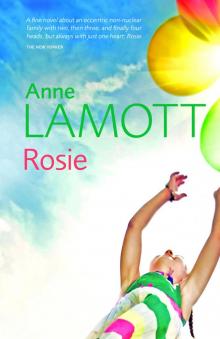 Rosie
Rosie Crooked Little Heart
Crooked Little Heart Bird by Bird: Some Instructions on Writing and Life
Bird by Bird: Some Instructions on Writing and Life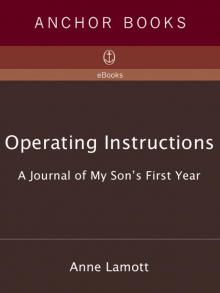 Operating Instructions: A Journal of My Son's First Year
Operating Instructions: A Journal of My Son's First Year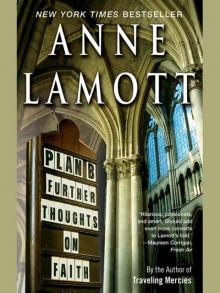 Plan B: Further Thoughts on Faith
Plan B: Further Thoughts on Faith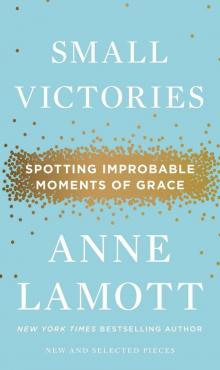 Small Victories: Spotting Improbable Moments of Grace
Small Victories: Spotting Improbable Moments of Grace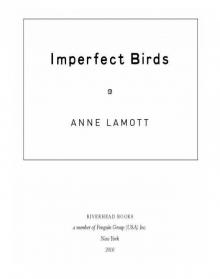 Imperfect Birds
Imperfect Birds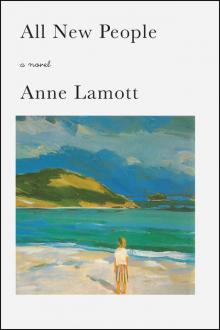 All New People
All New People Grace (Eventually)
Grace (Eventually)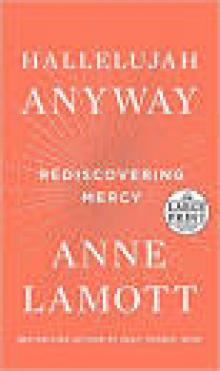 Hallelujah Anyway
Hallelujah Anyway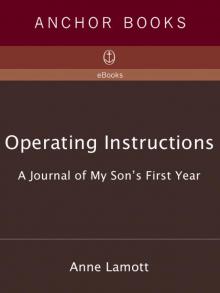 Operating Instructions
Operating Instructions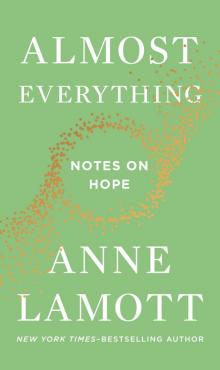 Almost Everything
Almost Everything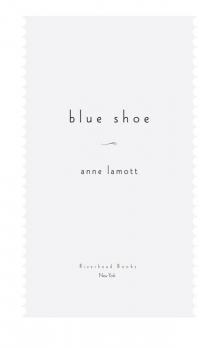 Blue Shoe
Blue Shoe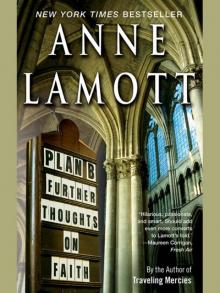 Plan B
Plan B Bird by Bird
Bird by Bird